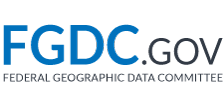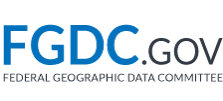The 2009 CAP announcement is available here.
- 2009 Projects Factsheet (PDF Format)
- Project List - includes status information
-
Project Maps: Interactive
 or PDF version
or PDF version 
Category 1: Metadata Trainer and Outreach Assistance provides assistance to organizations with NSDI expertise knowledge and experience in assisting other organizations with the training and implementation of metadata. Up to $25,000 per project. Category Lead - Sharon Shin.
Winston-Salem State University, Transforming Communities Research Lab
Winston-Salem, North Carolina
Timothy Mulrooney
Penobscot Indian Nation
Old Town, Maine
Binke Wang
Category 2: Behind the Portal - Use of GOS Map and Data Services
The Geospatial One-Stop Portal provides a human user interface to locate, visualize, and download domestic geospatial data. Because the GOS Portal, geodata.gov, supports standard formats and protocols, its catalog service interfaces allow search and retrieval of metadata on data, services, and other resource types referenced by URL that may be consumed by external clients such as desktop GIS, geo browsers, and other client software. Syndicated feeds of geospatial metadata based on a standing query can also be generated by the portal. In addition, the harvested GOS metadata are exposed for web crawlers and search engines to consume and provide exposure to a broader user community. Map and data services that are provided by publishers in GOS can be used by traversing the links exposed through these various methods, and not only through the traditional browser, but also through commercial and open-source clients to support diverse business processes.
The objective of this category is to promote the development and sharing of client or server-mediated applications (e.g. desktop GIS, decision support software, models, other portals) that can access and exploit the geospatial data and services referenced by GOS in support of a specific transferable and popular geographic or discipline requirement. Up to $40,000 per project. Category Lead - Doug Nebert.
The Carbon Project
Burlington, Massachusetts
Jeff Harrison
Center for Intelligent Spatial Computing (CISC) at George Mason University
Fairfax, Virginia
Chaowei Phil Yang
Innovate!, Inc.
Alexandria, Virginia
Jessica Zichichi
MobiLaps LLC
Silver Spring, Maryland
Nadine Alameh
Category 3: Fifty States Initiative
Projects will develop and implement statewide strategic and business plans that will facilitate the coordination of programs, policies, technologies, and resources that enable the coordination, collection, documentation, discovery, distribution, exchange and maintenance of geospatial information in support of the NSDI and the objectives of the Fifty States Initiative Action Plan. Up to $47,000 per project. Category Lead - Milo Robinson. Go here for more information about this initiative.
Arkansas
Shelby Johnson
Michigan
George Boersma
Arizona
Eugene Trobia
Oregon
Cy Smith
Delaware
Michael Mahaffie
Virginia
Daniel Widner
Kentucky
Brian Kiser
Washington
Joy Paulus
Category 4:Enabling Use of Government Tabular Data in a Geographic Context
Abundant 'business' data within all levels of government include reference to a location by address, code, or coordinates. These data frequently reside in a database, spreadsheet, or file but may not have been used to create a map or to perform geographic analysis. In short, they are not being exploited by their owners as geographic data. The Office of Management and Budget’s Geospatial Line of Business identifies an inherent benefit in the ability to access, exchange, and visualize such loosely-georeferenced tabular information with other geospatial data for analysis and applications. As the conversion of such tabular data into "geo-enabled" data sets is not straightforward to the non-GIS community, the FGDC seeks collaborative development with a company to publish a shared public web service that can make geo-enablement easy and productive. The objective of this CAP Category is to develop, demonstrate, and operate a high-performance, public standards-based Web Service to create geospatial datasets automatically from tabular government data merged with geospatial features. Resulting data and services will allow the data to be discovered, accessed, and applied in its geographic context. A demonstration by the awardee of the process with at least three strategic Federal government data sets is also an expected outcome. Up to $150,000. Category Lead - Doug Nebert.
FortiusOne, Inc.
Arlington, Virginia
Andrew Turner
Category 5: Building Data Stewardship for The National Map and the NSDI
Will assist organizations and consortia to develop stewardship agreements and capabilities that provide long term maintenance of transportation geospatial information that serves Federal, State, Tribal, regional and local community needs. Participation is sought from those organizations with existing transportation data and services considering long-term maintenance of the data that is of interest to The National Map and its users. Funds may help participants overcome impediments to participation and improvements to their data and services as part of the NSDI.Primary needs for transportation data are updates for features, attributes, and geometry of roads, railroads, trails and airports in The National Map. The data will be part of a national data inventory of consistent, seamless, integrated data that is continuously improved through the incorporation of data updates from the data community. Yp to $50,000 per project. Category Lead - Paul Wiese.
Kenai Peninsula Economic Development District
Kenai, Alaska
John Torgerson
Michigan Center for Geographic Information (CGI)
Lansing, Michigan
Rob Surber
State of Montana Base Map Service Center
Helena, Montana
Stewart Kirkpatrick
Utah Automated Geographic Reference Center (AGRC)
Salt Lake City, Utah
Bert Granberg
Category 6: FGDC Standards Development and Implementation Assistance and Outreach (excluding Metadata Standards) will provide funding to organizations to assist in the development of and/or implementation of standards in the FGDC standards program of work other than those for metadata (see category 1 above). This category can provide support that will assist in advancing a draft standard through the FGDC standards process or implementing an FGDC-endorsed standard. In many cases, there are few, if any, materials that can be used to guide others when implementing an FGDC-endorsed standard in their organization. Without materials that document best practices, provide experienced advice, and new techniques, an implementing organization has a steep learning curve. This category can provide materials that provide step-by-step assistance, or at least, a roadmap for implementing FGDC-endorsed standards. Up to $25,000 per project. Category Lead - Julie Binder Maitra.
Old Dominion University
Norfolk, Virginia
Guoqing Zhou
OGC Interoperability Institute
Los Altos, California
Phillip Dibner
Category 7: Demonstration of Geospatial Data Partnerships across Local, State and Federal Government
The vision for the NSDI includes the integration of all levels of government including the processes for local data to feed into State holdings, which then feed into Federal programs such as The National Map. This category will support the further development and documentation of partnerships and processes to implement this nested approach for one or more data themes of NSDI using The National Map. Up to $75,000 per project. Category Lead - Tracy Fuller.
INSIDE Idaho at the University of Idaho Library
Coeur d’Alene, Idaho
Bruce Godfrey
DuPage County, Illinois Department of Information Technology, GIS Division
Wheaton, Illinois
William Faedtke
Indiana Geographic Information Council, Inc. (IGIC)
Indianapolis,Indiana
Philip Worrall
Missouri Spatial Data Information Service (MSDIS)
Columbia, Missouri
Mark Duewell

